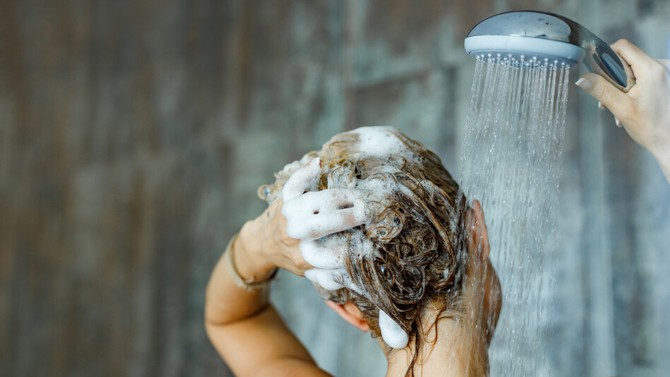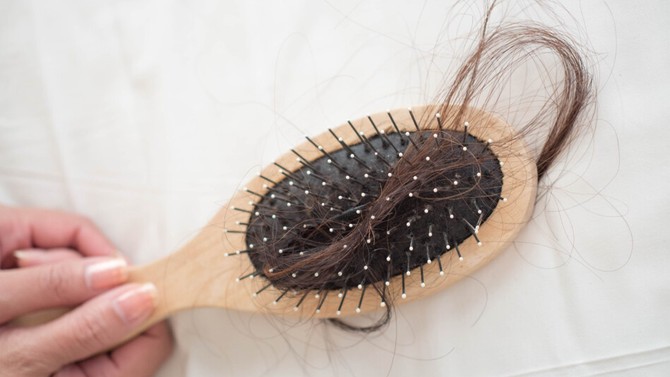6 Secrets Your Hair Is Trying to Tell You
The condition of your hair says something about your habits, diet and the way you live your life.
By Corrie Pikul

Photo: Mindful Media/Getty Images
#1: You just need some time to adjust to your new birth control pills.
Every single time you mess with your hormones, your body reacts in some weird and surprising way. "We can tell when someone is on a new type of birth control because it can make their hair finer, drier and less shiny," says Rita Hazan, a celebrity colorist and owner of the Rita Hazan Salon in Manhattan. This is especially noticeable when you're getting your hair colored: dry hair absorbs color faster, so you could end up with a different look than the last time you had the exact same procedure.

Photo: Oscar Wong/Getty Images
#2: You don't really need to use a shampoo designed for color-treated hair.
Colorists swear that regular shampoos, which contain high percentages of parabens, sulfides and other detergents, strip color molecules from the hair cuticle. "These ingredients will affect the way your color looks and how long it lasts," says Hazan. But if your current shampoo doesn't contain ingredients like sodium or ammonium lauryl sulfate and sodium or ammonium lauryl ether sulfate, and you're also using a moisturizing conditioner, you don't need to spend money on a new product—unless you want to.

Photo: shironosov/Getty Images
#3: Maybe going vegan wasn't such a great idea.
Especially if you're a pasta-and-PBJ vegan who replaced meat and fish with carbs and nuts. To keep your hair strong and supple, it's important to make sure you're getting enough protein and, especially, iron. Without the latter, you may find yourself at risk for anemia, which can cause thinning hair (especially around the temples), says Jessica Krant, MD, MPH a board-certified dermatologist, Fellow of the American Academy of Dermatology and founder of Art of Dermatology in New York.
Fortify your hair by making sure you get the government-recommended amount of around 18 mg of iron a day (8 mg if you're over 50). Meat, eggs and shellfish are the best-known sources, but you can also get iron from a diet abundant in the right leafy green vegetables, legumes and fortified grain products. (Supplements are another option, but definitely talk to your doctor first, because an excess of iron won't do your hair any good, and also may damage your heart and liver.)

Photo: skynesher/Getty Images
#4: You've developed a bit of an addiction...
...to your dandruff shampoo. Although the flakes have disappeared (thank you!), so has every drop of moisture from your strands. Daily use of dandruff shampoo may dry and damage hair, says Amy McMichael, MD, chair of dermatology at Wake Forest University. The chemicals that treat the dandruff—which could include an antifungal agent, sulfur or another medicinal chemical—aren't usually compatible with ingredients that keep your hair glossy and touchable.
McMichael recommends limiting use of dandruff shampoo to twice a week, and using a moisturizing shampoo and conditioner on the other days you wash (rub them into your scalp, not your hair, says McMichael, because that's what needs the TLC).

Photo: Phimchanok Srisuriyamart/EyeEm/Getty Images
#5: You're going to get through this.
You were so distraught about your partner's bomb of a confession that you were unable to eat or sleep, and you lost a ton of weight. You felt gaunt, tired and defeated. Yet now that some time has passed and you finally feel like you're getting to a better place, your hair starts falling out. Don't interpret this as a sign that you're falling apart, too, says McMichael. It takes about three months for your hair to go through an entire growth cycle. So the hair isn't reacting to anything new; the shedding is due to the extreme weight loss that happened a few months ago. In fact, not only are you going to get through this, but you've already started to come out the other side.

Photo: Maskot/Getty Images
#6: Time to schedule an appointment (now, please).
While all-over shedding can be relatively common with age, losing hair in tiny patches is not. It can be caused by many things, some quite serious: an autoimmune disorder called alopecia areata, thyroid dysfunction and even STDs. If you notice your bald scalp peeking through your hair in circular patches, Krant suggests talking to your doctor, who can help you figure out what's going on.
Published 04/21/2014

